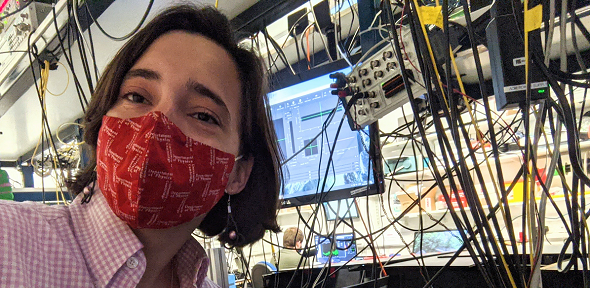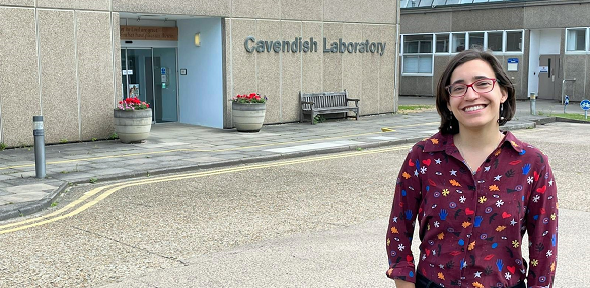
Cavendish PhD student Simone Eizagirre Barker has been awarded the D.J. Lovell Scholarship by SPIE, the international society for optics and photonics, for her potential contributions to the field.
It’s normal to feel a bit out of your depth when starting a new project, so remember that we’re researchers, continually learning new things!
The D.J. Lovell Scholarship is the largest and most prestigious scholarship by SPIE and will contribute to supporting Simone during her PhD, which she’s doing at the EPSRC Doctoral Training Centre in Nanoscience and Nanotechnology, supervised by Professor Mete Atatüre and Dr Sam Stranks.
Can you tell us about your PhD research?
I work in the Quantum Optical Materials and Systems Group in AMOP, where we study materials that emit light one particle (photon) at a time. Single-photon light sources are the building blocks of quantum technologies based on light: if we want to use light to communicate quantum information, we need to be able to control the quantum properties of individual photons and generate them reliably. Often, the light-emitting properties of these materials can also be affected by applying magnetic fields, so they are also interesting for quantum sensing and magnetometry.
My PhD focuses on a hexagonal boron nitride (hBN), a two-dimensional material similar to graphene. hBN crystals are transparent, but can host atomic-scale defects that interact with visible light and emit in the form of single photons. It’s an exciting project to be working on because the quantum optical properties of hBN have only been known for about six years, so there is still a lot we don’t understand about them: the atomic structure of some of these defects is a mystery, for a start. And we’re only just beginning to understand how their optical properties are affected by magnetic fields. I enjoy it because being at this early stage means there’s space for a lot of creativity in our experiments and thinking, and you never know how the next results will surprise you.
What led you to physics? and Quantum optics in particular?
My journey to optics has been completely unexpected, I just explored what I found interesting at the time and followed where that took me - I wouldn’t have predicted I’d end up in a quantum optics group! As a child I was interested in pretty much everything - for a while I wanted to be a writer or a politician - but I ended up studying Chemical Physics at university (University of Edinburgh) because I was interested in learning more about how our world and our technologies work.
I realised I really enjoyed working in experimental science after doing a summer internship in a polymer research institute, where I got to do a lot of fun chemical synthesis reactions. During my undergraduate studies I also had the opportunity to spend a year in a photonics research lab during my year abroad, and I started to become interested in how light can be used to explore the properties of materials.
My current project is based on physics that’s completely different to what I’ve worked on before, but at its core is still about understanding the origins of the light emission in this material and its spin physics. I guess what I like about quantum optics is that day-to-day it has that experimental aspect of being in the lab, but you still get to work on very fundamental questions.
You are involved in various science communications initiatives with the University; can you tell us about those and maybe how they help you in your research work?
I’m mainly involved with the university’s science magazine’s podcast (BlueSci), which I host and produce with Ruby Coates. We’ve been doing it for over a year now (27 episodes and counting!), interviewing researchers from a whole range of disciplines and stages in their career. It’s been very interesting because besides learning about cool research, listening to so many different people’s journeys into science and learning about what drives them in their work has also been a consistent source of inspiration and insight.
I also do some freelance science writing for magazines like Chemistry World and Massive Science, and of course the university’s own BlueSci. Writing and communicating research is a fundamental part of doing science, no matter the audience, so becoming a better writer is always useful! I’ve always loved writing so it’s also a creative outlet for me to bring together different aspects of what I’m interested in.
My journey to optics has been quite serendipitous, so it means a lot to have the support of the photonics community. I’m very grateful to SPIE for believing in me, and to everyone who’s encouraged my scientific journey so far.
Pandemic aside, how is life as a Graduate student at the Cavendish?
I spent a good six months at the Cavendish as an MRes student before the pandemic began, so I also got to see what it was like in more normal times as well. I do think your experience in the Department will depend a lot on your research group, but overall I’ve really enjoyed it. Some people dislike that the department is not in the centre of town; personally I enjoy the ‘campus’ vibe and having some compulsory bike rides in my day! It also means you can meet with friends by the pond or go for a walk by the fields when you want to take a break, which is quite nice in good weather.
Because there’s so many research groups in one place, it’s an interesting hub of different people and perspectives. There’s quite a lot of opportunities to meet students in other groups through seminars, societies or networking events. For example, I’m involved with Cavendish Inspiring Womxn, a student society that aims to increase the visibility of gender minorities in physics and provide a community of support for women and non-binary students and staff in the department, as well as being part of the local SPIE student chapter, where I’ve met other students working in optics and photonics in Cambridge.
What is the one piece of advice you would have liked to hear before embarking on your PhD, and you could now share with others?
I would have reminded myself that there isn’t a right choice to make when it comes to deciding what you want to do - you can always change your mind! I was quite interested in a lot of things so choosing what to do for the next four years of my life felt very overwhelming. There’s a lot of advice out there for choosing a PhD, which is great, but we also put a lot of pressure on young people when making decisions about their future. I would have told myself to worry less about figuring out the best possible decision and just focus on making one I was happy with.
Also, it’s normal to feel a bit out of your depth when starting a new project (at least I do), so remember that we’re researchers, continually learning new things! Working on a three or four year project is very different to having specific assignments or exams to work towards, and whilst the freedom and creativity of that is great, knowing how to plan your time and aims to work in that mindset takes some getting used to. Give yourself time to figure out what works for you, and don’t hesitate to ask for support.
What are your future career plans?
Well, given my response to these questions, you won’t be surprised to know that I have no concrete plans - my approach is more to pursue interesting things as I learn about them! I definitely want to continue working in research, and I’m becoming more and more interested in technology and the translation of science into real-world applications. There are so many cool light-based technologies that I’d love to learn more about, and plenty of interesting physics to do with them. I’m also still very interested in how science and technology impact our society, and so I hope to continue getting involved in science journalism and outreach projects in the future.
What does this scholarship mean to you?
I’m honoured! I really wasn’t expecting it. My journey to optics has been quite serendipitous, so it means a lot to have the support of the photonics community. I’m very grateful to SPIE for believing in me, and to everyone who’s encouraged my scientific journey so far and given me opportunities to grow as a researcher.

